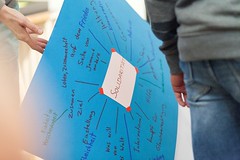Making Democracy
Negotiating freedom, equality and solidarity among adolescents
In this project, we investigated, how school students negotiate fundamental democratic norms – such as freedom, equality and solidarity – in their everyday life. Collaborating with a team of scientists, artists, educators and teachers, students researched into the manifold ways in which, in their daily life, democratic questions of personal autonomy and constraint, of equality and discrimination, of solidarity and exclusion, impose themselves.
The research goal consisted in a cartography of the quotidian zones where the meaning democracy is negotiated. In this way, claims raised in democratic theory concerning an alleged normative conflict between, for instance, demands of autonomy and community, or between individuality and solidarity, can be tested within the field of political culture.
Apart from these research goals, the project had the practical aim of fostering the democratic attitudes of participating youths. Assuming that the capacity for political agency is increasingly experienced as blocked under conditions of ‘post-democracy’ (Crouch), it is all the more important to engage with fundamental democratic norms. These norms also informed the research process. To this end, methods of qualitative research were conveyed to the participating youths so that they were enabled to collect and interpret data by themselves. Methodologically, ‘Making Democracy’ expanded approaches of participatory research and critical art education. The results were translated by the students into a theatre play and a graphic novel and were presented to the public.
This project is already completed.
Publikation
-
In: SWS-Rundschau, Heft 2/2019, 59. Jahrgang, 181-199.
-
In: GOTTUCK, S./GRÜNHeID, I./MECHERIL, P./WOLTER, J./ (Hrsg.): Sehen lernen und verlernen. Perspektiven pädagogischer Professionalisierung. Wiesbaden: Springer VS, 263-286.
-
transcript, Bielefeld, Deutschland (Tagungsband)
-
Journal noch offen
Tagungsbeitrag
 Schools
Schools
 Partners from Economy and Society
Partners from Economy and Society
 Scientific institutions
Scientific institutions




